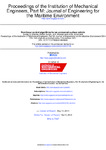Non-linear control algorithms for an unmanned surface vehicle
Date
2014-05Author
Subject
Metadata
Show full item recordAbstract
<jats:p> Although intrinsically marine craft are known to exhibit non-linear dynamic characteristics, modern marine autopilot system designs continue to be developed based on both linear and non-linear control approaches. This article evaluates two novel non-linear autopilot designs based on non-linear local control network and non-linear model predictive control approaches to establish their effectiveness in terms of control activity expenditure, power consumption and mission duration length under similar operating conditions. From practical point of view, autopilot with less energy consumption would in reality provide the battery-powered vehicle with longer mission duration. The autopilot systems are used to control the non-linear yaw dynamics of an unmanned surface vehicle named Springer. The yaw dynamics of the vehicle being modelled using a multi-layer perceptron-type neural network. Simulation results showed that the autopilot based on local control network method performed better for Springer. Furthermore, on the whole, the local control network methodology can be regarded as a plausible paradigm for marine control system design. </jats:p>
Collections
Publisher
Journal
Volume
Issue
Pagination
Recommended, similar items
The following license files are associated with this item:


